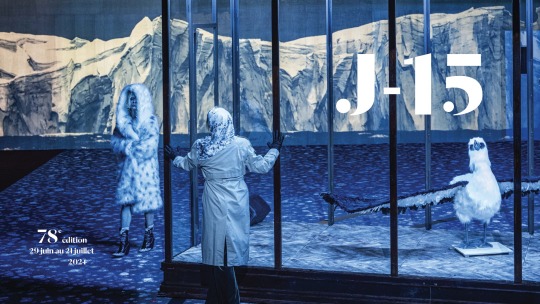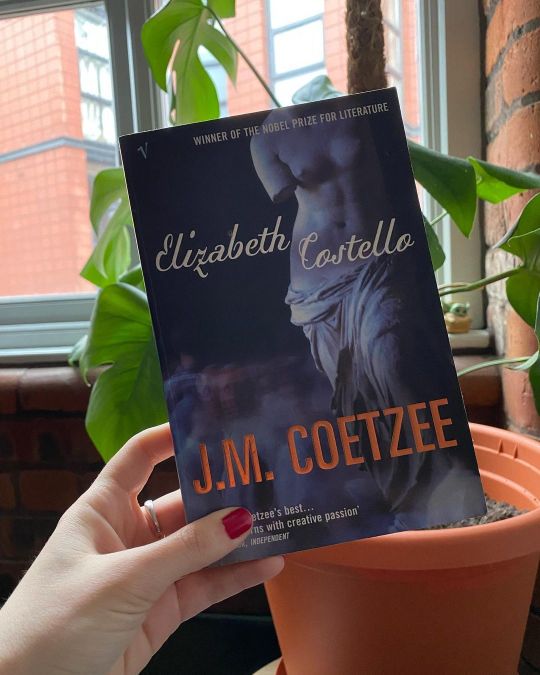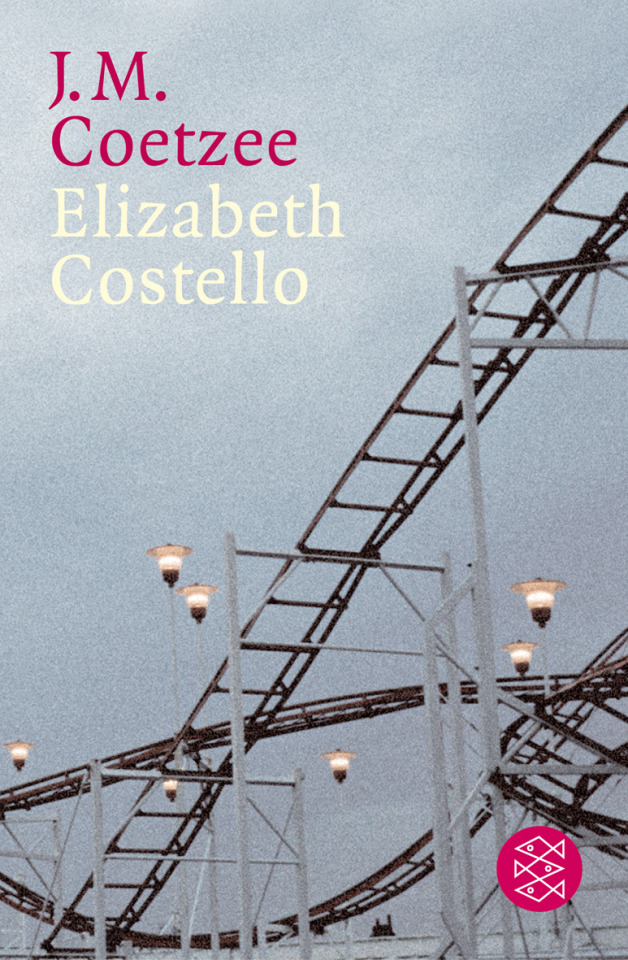#ElizabethCostello
Explore tagged Tumblr posts
Text
Awiniońskie chwile iluminacji Elizabeth Costello na Festival d’Avignon Tekst i zdjęcia: Maciej Hanus
Od warszawskiej premiery najnowszego spektaklu Krzysztofa Warlikowskiego, Elizabeth Costello. Siedem wykładów i pięć bajek z morałem, minęły ponad 3 miesiące. Zespół rozpoczął europejskie tournée pokazami na Epidaurus Festival w Atenach, chwilę później wyjechał do Barcelony na Grec Festival, a teraz przyszła pora na najważniejszą europejską scenę, słynny Cour d’honneru Pałacu Papieży w Awinionie. Opisuję 8 dni, podczas których towarzyszyłem zespołowi na południu Francji i niezwykle wymagający set 5 spektakli, zagranych pod gwieździstym niebem. Dokonajmy przeskoku w czasie!

0 notes
Photo

one of my least favourite coetzee novels. elizabeth costello is about a famous australian writer who is about to receive an award. at her acceptance speech, she gives a confusing talk about franz kafka. this does not go well, and the novel is resultantly about her coming to terms with her role as a writer. similarly to ‘diary of a bad year’, the novel is formatted in utilising a series of titles such as ‘the lives of animals’, though the chapters in ‘costello’ are fiction instead of nonfiction, though this does occasionally blur. the novel utilises a lot of philosophical rhetoric, but it feels incredibly pompous and indulgent - there is far too much name dropping without the plot actually advancing. It’s a plethora of self aggrandising without any purpose. hoping to read ‘the death of jesus’ soon to complete the trilogy and restore my faith in his writing. 1/5 ⭐️ #book #books #bookstagram #ukbookstagram #coetzee #jmcoetzee #whitesouthafrican #nobelprize #nobelprizeliterature #southafrica #elizabethcostello https://www.instagram.com/p/CMSdJ7dF9b-/?igshid=yqaolgdbnobs
#book#books#bookstagram#ukbookstagram#coetzee#jmcoetzee#whitesouthafrican#nobelprize#nobelprizeliterature#southafrica#elizabethcostello
0 notes
Text
"Cuando María, bendita entre las mujeres, esboza su remota sonrisa angelical y levanta su dulce pezón rosado ante nuestra mirada, y cuando yo, imitándola, descubro mis pechos para el viejo señor Phillips, estamos llevando a cabo actos de humanidad. Actos que no pueden llevar a cabo los animales, que no pueden descubrirse porque no se cubren nunca. Nada nos obliga a hacerlo, ni a mí ni a María. Pero lo hacemos igualmente movidas por el desbordamiento, la efusión de nuestras humanidades: dejamos caer la ropa, nos descubrimos, descubrimos la vida y la belleza con las que estamos bendecidas."
― de "Elizabeth Costello"
0 notes
Photo

A novel about the fictional writer and scholar Elizabeth Costello. If this fantastic novel interests you, read The Lives of Animals, which is lesson two--the novel is comprised of many lessons in the form of academic lectures and their further discussion--followed by commentary from Peter Singer (philosopher), Wendy Doniger (Indologist) and Barbara Smuts (anthropologist). In this lecture the mind/body dichotomy is revised by Costello as she argues that the opposition of thinking and body is far removed from the intuitive and immediate feeling of existence that we experience. In her controversial lecture advocating against cruelty against animals and carnivore diets, she presents several arguments that aim to undermine the importance of rationality as the sole constituent of our humanity, and to illustrate the harm that the subjugation of the body inflicts on our sensation of being. The subordination of the body to the faculties of reason far removes us from that sensation of awareness that “comes from living not in or as a body but simply from being an embodied being”.
“To thinking, cogitation, I oppose fullness, embodiedness, the sensation of being- not a consciousness of yourself as a kind of ghostly reasoning machine thinking thoughts, but on the contrary the sensation – a heavily affective sensation- of being a body with limbs that have extension in space, of being alive to the world”
Costello makes a reference to “Report to an Academy”, a story written by Kafka. In the story, a chimp named Red Peters– who has been educated, taught to speak eloquent English and upon which many anthropomorphic features have been imposed– is about to give a lecture to a room full of scholars. She uses this, in a controversial and bold lecture she is giving herself against cruelty against animals and carnivore diets, partly to animate the connection between Peters and other chimps and Peters and other humans. Why does reason determine our humanity? And what about a chimp that displays the same behaviour and signs of rationality; would he be, by virtue of that, as human as us? As liable to be granted the same rights?
“If Red Peters had any sense, he would not have any children. […] It is hard to imagine the child of Red Peters as to imagine the child of Franz Kafka himself. Hybrids are, or sought to be, sterile; and Kafka saw both himself and Red Peters as hybrids, as monstrous thinking devices mounted inexplicably on suffering animal bodies. The stare that we meet in all the surviving photographs of Kafka is a stare of pure surprise: surprise, astonishment, alarm. Of all men Kafka is the most insecure in his humanity. This, he seems to say: this is the image of God?”
In the following quote Costello addresses her sister, a missionary nun in South Africa, regarding the work of Joseph–a man who has spent his entire life making carvings of Jesus in the cross.
“Why does the model you, or if not you then the institution you represent– why does the specific model you set before Joseph and tell him to copy, to imitate, have to be what I can only call Gothic? Why a Christ dying in contortions rather than a living Christ? A man in his prime, in his early thirties: what do you have against showing him alive, in all his living beauty? And, while I am about it, what do you have against the Greeks? The Greeks would never have made statues and paintings of a man in the extremes of agony, deformed, ugly, and then knelt before those statues and worshipped them. If you wonder why the humanists whom you wish us to sneer at looked beyond Christianity and the contempt that Christianity exhibits for the human body and therefore man himself, surely that ought to give you a clue. You ought to know, you cannot have forgotten, that representations of Jesus in his agony are an idiosyncrasy of the Western Church. […]. Frankly, there is something about the entire crucifixional tradition that strikes me as mean, as backward, as medieval in the worst sense – unwashed monks, illiterate priests, cowed peasants. What are you up to, reproducing that most squalid, most stagnant phase of European history in Africa?”
And there’s much more:
“The Southern Ocean. Poe never laid eyes on it, Edgar Allan, but criss-crossed it in his mind. Boatloads of dark islanders paddled out to meet him. They seemed ordinary folk just like us, but when they smiled and showed their teeth the teeth were not white but black. It sent a shiver down his spine, and rightly so. The seas full of things that seem like us but are not. Sea-flowers that gape and devour. Eels, each a barbed maw with a gut hanging from it. Teeth are for tearing, the tongue is for churning the swill around: that is the truth of the oral. […] Only by an ingenious economy, an accident of evolution, does the organ of ingestion sometimes get to be used for song.”
“[The numbers of deaths at Treblinka] are numbers that numb the mind. We have only one death of our own; we can comprehend the deaths of others only one at a time. In the abstract we may be able to count to a million, but we cannot count to a million deaths.”
“It’s that I no longer know where I am. I seem to move around perfectly easily among people, to have perfectly normal relations with them. Is it possible, I ask myself, that all of them are participants in a crime of stupefying proportions? Am I fantasizing it all? I must be mad! Yet every day I see the evidences. The very people I suspect produce the evidence, exhibit it, offer it to me. Corpses. Fragments of corpses that they bought for money. It is as if I were to visit friends, and to make some polite remark about the lamp in their living room, and they were to say ‘Yes, it’s nice, isn’t it? Polish Jewish skin it’s made of, we find that’s best, the skins of young Polish-Jewish virgins.” And then I go to the bathroom and the soap wrapper says 'Treblinka – 100% human stereate.’ Am I dreaming, I say to myself? What kind of house is this? Yet I’m not dreaming. I look into your eyes, into Nora’s, into the children’s, and I see only kindness, human kindness. Calm down, I tell myself, you are making a mountain out of a molehill. This is life. Everyone else comes to terms with it, why can’t you? Why can’t you?“
”…there is no limit to the extent to which we can think ourselves into the being of another. There are no bounds to the sympathetic imagination.“
"There is disgust…. We may have got rid of the gods but we have not got rid of disgust, which is a version of religious horror.”
0 notes